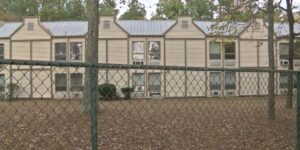Family caretakers often assume the responsibility of caring for aging parents and grandparents until the burden becomes too great, sometimes out of fear that leaving elder family members in an assisted living facility will subject them to bad actors and bad living conditions. The story of Jones & Jones is an alarming reminder of what could happen when a nursing home or assisted living facility takes advantage of its residents.

Jones & Jones: A worst-case scenario
A shut-down assisted living facility sits in the Forest Hill neighborhood of Richmond, and the former owner is in prison. Before her incarceration, Maybel Jones owned and operated Jones & Jones, which served elderly and incapacitated adults.
Jones pled guilty to fraud after authorities discovered she diverted over $800,000 in state and federal benefits that were meant for the people in her care. Her “diversion of resident benefits led to significant and persistent deficiencies in the facilities, care, and services provided to Jones & Jones residents, including deficiencies that endangered residents’ health and safety,” said the Department of Justice.

Exterior view of the shuttered nursing home Photo credit: WWBT-TV
An investigation was initiated after reports of mistreatment of the residents and the airing of unsettling videos that a resident submitted to a local news station came to light. The conditions inside the facility were deplorable. The residence itself was infested with bedbugs. Additionally, the linens on the beds were soiled, wet, and covered in blood. The residents’ clothing was dirty and sometimes also ill-fitting. The building conditions were considered unsafe and unsanitary.
After this Richmond controversy came to light, The Department of Justice stated that they are “steadfastly committed to combatting all forms of elder abuse and financial exploitation through enforcement actions, training and resources, research, victim services, and public awareness.”
Placing a loved one into full-time nursing home care is one of the hardest decisions a family will make. To ensure adequate care for aging family members who were once caretakers themselves, a family should review all of the reliable information regarding nursing home quality before placing an elder into an assisted living facility.

Who oversees the quality of assisted living facilities?
The National Center for Health Statistics (NCHS) is a U.S. government agency that provides statistical information to guide actions and policies to improve public health. The NCHS is a unit of the Centers for Disease Control and Prevention and is a good starting point for nursing home statistics. Per NCHS, within the United States, there were an estimated:
- 4,700 hospice facilities
- 15,600 nursing homes
- 31,400 residential care communities
- 400 long-term care hospitals
The Centers for Disease Control and Prevention reports that 1.3 million Americans are residents of long-term care providers.
How do I determine my relative’s needs?
When looking for the right long-term care facility for your loved one, the options seem endless. While the process is extremely personal, there are resources available to help you choose the right facility.
Understand your loved one’s level of care
Each person in an assisted living facility has different medical needs and activity levels. It is important to recognize the level of care your loved one requires before choosing a long-term care provider. Does your family member have a chronic health issue that requires daily maintenance or around-the-clock care, or does he or she need less supervision?
- Learn your relative’s day-to-day needs before determining their level of care. While some residents may need medication maintenance or meal preparation, others may need assistance with bathing, using the restroom, or mobility to guide them from one location to another.
- If your relative has conditions like diabetes, arthritis, or cognitive impairment, you must perform due diligence to ensure that the facility has the support staff necessary.
 Vet the nursing home facility
Vet the nursing home facility
After you have determined the health and medical needs of your relative, it is important to research the nurses and treatment providers that are employed by the facility. The U.S. News and Health Report is a useful tool for determining if a facility is a good fit for your relative.
- This tool gathers long-term and short-term care facilities and is sorted according to zip codes.
- Once you have chosen a facility from the list, criteria such as cost, location, inspections, and ratings can be input as additional filters.
- For each facility on the list, you can see statistics on nurse staffing consistency, weekend staffing, residents prescribed psychotropic drugs, and infections resulting from facility care.
Visit the nursing home before signing the housing contract
You should schedule a site visit to the chosen facility before moving your elder family member into his or her new home.
- When scheduling your initial visit to a long-term care facility, it is helpful to use Medicare as a tool for determining quality of care and fit. Specifically, Medicare provides a Nursing Home Checklist. This easy chart will serve as your guideline when ranking facilities. Medicare provides multiple questions for facility certifications, nursing home living spaces, menus, food, staff, residents’ rooms, activities, and safety. Use this checklist to determine if a specific facility will keep your relative safe, and healthy. It will provide your relative with the proper socialization and nutrition they will need during this phase of their life.
- To facilitate an easier transition, and to help your relative feel empowered, bring them along. They too can be on the lookout for red flags. As scary as it may be for you to put your family member into an assisted living facility, it can be even more jarring for your relative—the person actually making the move. For most people, it is a challenge to move away from home and into a strange place, with new faces, schedules, and smells.
- It is a best practice to visit the facility a second time. It is important to visit at a different time and on a different day. Remember, your relative will often reside at the chosen facility for twenty-four hours per day. Visiting on a different day, with different staffing will allow you to confirm your positive first impression.
Vet the nursing home staff
For perhaps the first time, your relative will have to depend on a stranger for every aspect of their life. Their meals will be cooked by strangers, their room will be cleaned by strangers, and often their bodies will be cleaned by people they have never met before.

As important as the physical facility might be, the individuals employed equally matter. With that in mind, there are a few things to look for when determining if the facility staff has the right experience, temperament, and caseload. A few simple observations can go a long way.
- Are the staff members wearing name tags?
- Are they referring to each resident by name? In any environment, names are important. When your relative is transitioning into a new home, it is imperative that they feel the humanity of someone referring to them by their name when they are greeted.
- Most importantly, does the relationship between staff and residents appear to be warm, polite, and respectful?
When in doubt, refer back to the Medicare Nursing Home Checklist, which provides many more questions and observations than are included in this article. While no checklist is exhaustive of every question that could be asked, the checklist will allow you to ask the right questions and avoid many of the easily missed red flags that exist at long-term care facilities.
If you believe your relative has been placed at the wrong nursing home and has been injured due to abuse or the negligence of the staff, please contact the compassionate nursing home attorneys at Allen & Allen. For a free and confidential consultation, call 866-388-1307.



